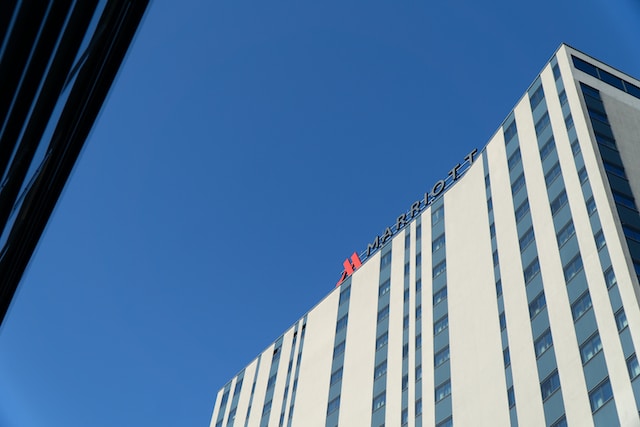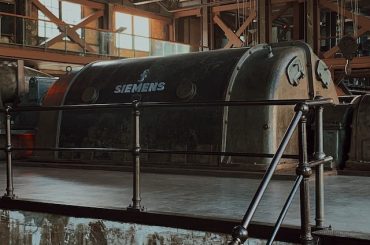Before we dive deep into the PESTEL analysis, let’s get the business overview of Marriott. Marriott International is a leading global hospitality company offering a diverse portfolio of brands and accommodations across various price points and markets. The company, founded in 1927 by J. Willard and Alice Marriott, has become one of the world’s largest hotel chains.
As of 2022, Marriott operated over 8,000 properties under 30 brands in over 130 countries and territories, including 2,053 company-operated properties (576,243 rooms) and 6,122 franchised and licensed properties (937,683 rooms and timeshare units).
The company’s portfolio includes luxury, premium, select, and longer-stay properties, allowing Marriott to cater to various customer preferences and needs. Some of their well-known brands include Marriott, Ritz-Carlton, Sheraton, Westin, Courtyard, Residence Inn, and Aloft.
Marriott operates on a primarily franchise-based model, which enables the company to expand rapidly while minimizing capital investments. In addition to its franchised properties, Marriott also manages a smaller number of owned and leased hotels.
The company’s business strategy focuses on continuously expanding its global footprint, enhancing its loyalty program (Marriott Bonvoy), and leveraging technology to improve guest experiences and operational efficiency.
- For 2022, gross fee revenues totaled $4.1 billion, a significant increase of more than 50 percent compared to 2021.
- Marriott generated a net income of $2.4 billion, a 140% increase from 2021.
- At year-end 2022, Marriott’s total debt was $10.1 billion, and cash and equivalents totaled $0.5 billion.
Here is the PESTEL analysis of Marriott
A PESTEL analysis is a strategic management framework used to examine the external macro-environmental factors that can impact an organization or industry. The acronym PESTEL stands for:
- Political factors: Relate to government policies, regulations, political stability, and other political forces that may impact the business environment.
- Economic factors: Deal with economic conditions and trends affecting an organization’s operations, profitability, and growth.
- Sociocultural factors: Relate to social and cultural aspects that may influence consumer preferences, lifestyles, demographics, and market trends.
- Technological factors: Deal with developing and applying new technologies, innovations, and trends that can impact an industry or organization.
- Environmental factors: Relate to ecological and environmental concerns that may affect an organization’s operations and decision-making.
- Legal factors: Refer to the laws and regulations that govern businesses and industries.
In this article, we will do a PESTEL Analysis of Marriott.
PESTEL Analysis Framework: Explained with Examples
Political
- Government Stability: Marriott operates in numerous countries, and the political stability of each country affects its operations. In unstable regions, risks could be related to security, asset safety, or unpredictable policy changes. On the other hand, stable governments are typically more conducive to business operations.
- Regulatory Framework: Every country has its regulatory framework for the hotel and hospitality industry. Changes or updates in regulations can affect Marriott’s operations, either through increased compliance costs or by opening up new business opportunities.
- Taxation Policies: Changes in taxation policies, such as increases in hotel or tourist taxes, can impact Marriott’s profitability. Tax incentives can make some regions more attractive for expansion or investment.
- Trade and Tariff Structures: If Marriott imports goods for its hotels, changes in trade policies and tariffs can affect its cost structure.
- Tourism Policies: Governments often promote tourism to boost the economy. Any policy that makes a country more attractive as a tourist destination can benefit Marriott. Conversely, policies discouraging travel or making visa processes more stringent can negatively impact them.
- Foreign Direct Investment (FDI) Policies: Countries with friendly FDI policies can make it easier for Marriott to invest and set up hotels. Restrictions on FDI might limit Marriott’s ability to expand in certain regions.
- Geo-political Tensions: Events such as conflicts, disputes, or tensions between nations can impact the flow of tourists and business travelers, thereby affecting hotel occupancy rates.
- Government’s Emphasis on Infrastructure Development: A government’s focus on improving infrastructure like roads, airports, and other amenities can positively impact the hotel industry. Good infrastructure makes travel more comfortable and might attract more tourists and business travelers.
- Health and Safety Regulations: Especially in events like the COVID-19 pandemic, political decisions on health and safety can drastically affect the hospitality industry. Lockdowns, quarantine mandates, and health safety standards can impact hotel operations.
Economic
- Economic Growth: The overall growth of an economy, represented by indicators like GDP growth, can directly impact the hospitality industry. A booming economy usually means more disposable income, increased business travel, and higher tourism rates—all beneficial for Marriott.
- Exchange Rates: Marriott operates globally, making it sensitive to fluctuations in currency exchange rates. A stronger dollar might make travel to the U.S. more expensive for international tourists, potentially affecting demand for U.S. properties. Conversely, a weaker dollar might boost international tourism in the U.S.
- Interest Rates: Changes in interest rates can influence Marriott’s financing decisions. Higher interest rates might increase the cost of borrowing for expansion or operations, while lower rates could provide opportunities for cheaper financing.
- Inflation Rates: High inflation can increase operational costs, including wages, utilities, and raw materials. This could pressure margins unless Marriott can pass these costs onto consumers via increased room rates.
- Price Sensitivity: Consumers and businesses might look for more budget-friendly travel options in challenging economic times. This could impact Marriott’s premium and luxury segments, pushing the brand to offer discounts or value-added services.
- Supply Chain Costs: Economic factors can influence the price of goods and services Marriott relies on, from restaurant food to room linens. Changes in these costs can affect Marriott’s profitability.
- Travel and Tourism Trends: Economic conditions influence travel trends. For example, there might be a shift towards domestic tourism over international travel during recessions. Recognizing and adapting to these trends is crucial for Marriott’s strategy.
Sociocultural
- Changing Lifestyle & Travel Preferences: As societies evolve, so do their travel and leisure preferences. A shift towards experiential travel, where guests seek authentic, local experiences rather than just accommodation, can affect Marriott’s offerings.
- Demographics: Changes in population structures, such as age distributions, can influence demand. For example, an aging population might prefer different amenities or locations than younger generations.
- Cultural Norms and Values: Respecting and aligning with local customs, traditions, and values is essential. Marriott might need to adjust its services based on cultural norms in specific regions, like dietary preferences or religious practices.
- Health and Wellness Trends: With the growing emphasis on well-being and fitness, many travelers prioritize hotels that offer gym facilities, spa services, healthy dining options, and wellness programs.
- Safety and Security Concerns: In certain cultures or due to events, there might be heightened sensitivity to safety and security. Marriott would need to prioritize these aspects to ensure trust among its guests.
- Use of Technology in Social Interactions: As technology increasingly mediates social interactions, hotels must consider how this affects guests’ experiences. For instance, offering digital check-ins, chatbots for service, or augmented reality tours can cater to tech-savvy travelers.
- Consumer Awareness and Brand Perception: In the age of social media, consumers are more informed and can easily share their experiences. This affects the importance of online reviews and reputation management for Marriott.
Technological
- Digital Booking Platforms: With platforms like Booking.com, Expedia, and Airbnb, Marriott must maintain a strong online presence. Integrating seamless booking experiences, often through mobile apps, is necessary to attract and retain customers.
- Integrated Management Systems: Modern hotel management systems offer integrated solutions, from room bookings to inventory management. Adopting these can streamline operations and enhance guest experiences.
- Artificial Intelligence (AI) & Chatbots: AI-driven chatbots can provide instant assistance to guests, handle reservations, answer FAQs, and even personalize experiences based on guest data.
- Internet of Things (IoT): Smart room technologies, such as voice-controlled devices or automated temperature and lighting controls, can enhance guest comfort and offer personalized experiences.
- Virtual Reality (VR) & Augmented Reality (AR): VR can offer potential guests virtual tours of rooms or facilities before booking. AR can enhance guests’ stay by offering interactive hotel maps or local tour guides.
- Data Analytics and Personalization: Marriott can offer personalized experiences, from room preferences to tailored promotions, by analyzing guest data. This improves guest satisfaction and increases the likelihood of repeat bookings.
- Connectivity: Reliable high-speed internet is almost a basic expectation for travelers today. Investing in robust Wi-Fi infrastructure is vital to meet guest demands, especially for business travelers.
- Robotics: In some hotels, robots are used for room service deliveries, cleaning, or even reception duties. Marriott may need to consider where and how to incorporate robotics to enhance efficiency without compromising the human touch.
Environmental
- Sustainability Initiatives: There’s a growing demand from travelers for sustainable and environmentally friendly hotel options. Marriott may need to implement green initiatives, like reducing water usage, energy-efficient lighting, and waste management systems.
- Carbon Footprint: As concerns about climate change increase, many companies are taking steps to reduce their carbon footprint. For Marriott, this could involve investing in renewable energy, efficient HVAC systems, and carbon offset programs.
- Local Sourcing: There’s a trend towards sourcing locally to reduce transportation emissions and support local communities. Marriott can consider local suppliers for food, materials, and other supplies to reduce its environmental impact and contribute positively to the local economy.
- Waste Management: Implementing comprehensive waste reduction and recycling strategies is crucial. This can include reducing single-use plastics, composting organic waste, and donating excess food.
- Water Conservation: In areas prone to drought or where water is scarce, hotels must be particularly conscious of their water consumption. Implementing technologies like low-flow fixtures, rainwater harvesting, or greywater recycling can be essential.
- Building Standards: When constructing new hotels or renovating existing ones, considering green building standards can reduce environmental impact. This includes using sustainable materials, green roofing, and efficient insulation.
Legal
- Licensing and Business Permits: Operating a hotel requires various licenses and permits, which can vary from country to country or even city to city. Marriott needs to ensure they have all the legal permissions for each property.
- Employment Laws: These laws cover minimum wage, work hours, equal opportunity, and fair treatment. Given Marriott’s global footprint, they must be aware of and compliant with employment laws in multiple jurisdictions.
- Health and Safety Regulations: Hotels are subject to strict health and safety regulations to ensure the well-being of their guests and staff. This encompasses food safety standards, building codes, and fire safety.
- Environmental Laws: As discussed in the Environmental section, there are legal standards and regulations about waste disposal, energy use, emissions, etc. Non-compliance can result in significant penalties.
- Real Estate and Zoning Laws: When building or renovating properties, Marriott must consider local real estate regulations, zoning laws, and building codes.
- Taxation Laws: Given its global operations, Marriott must navigate complex tax landscapes, ensuring compliance with local tax regulations, including those specific to the hospitality sector.
- Trade and Tariff Regulations: For hotels that import goods, it’s crucial to understand and adhere to trade regulations and applicable tariffs.
- Crisis Management and Liability: In cases of emergencies or mishaps, Marriott needs to have legal protocols in place to address potential liabilities, from accidents within their properties to issues stemming from third-party vendors.











